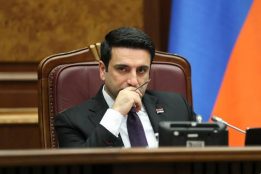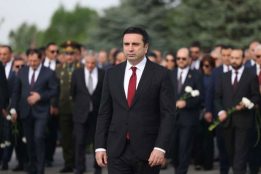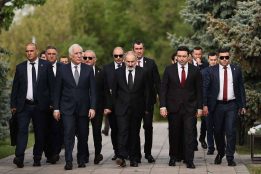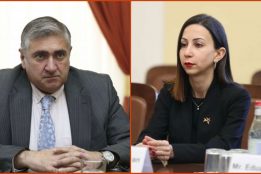
Steven A. Cook, Hasib J. Sabbagh senior fellow for Middle Eastern studies at the Council on Foreign Relations, touched upon Turkey’s foreign policy issues. Find the article below.
One day before announcing Wednesday, Nov. 21’s cease-fire agreement, at a brief news conference prior to talks between U.S. Secretary of State Hillary Clinton and Israeli Prime Minister Benjamin Netanyahu, late on Tuesday night, the secretary announced that her itinerary included Ramallah and Cairo in addition to Jerusalem. The visit to Palestinian Authority President Mahmoud Abbas was a head-scratcher — given how marginal he was to the conflict raging in the Gaza Strip — as much as talk with Egyptian President Mohamed Morsy is a no-brainer. There also seemed to be a glaring omission from Clinton’s shuttle: Ankara.
This was a surprise only if one took all the hype about Turkey’s aspirations to be a regional power broker and problem solver seriously. For all of Turkey’s apparent assets, including its good relations with Hamas and the regional popularity of its prime minister, Recep Tayyip Erdogan, it is Egypt that was at the center of diplomatic efforts to find a formula for a cease-fire. As for poor Turkish Foreign Minister Ahmet Davutoglu, whose plane is usually first to land in a crisis zone, he was a bit player in this drama. His visit to Gaza on Tuesday seemed late, especially as it came five days after Morsy dispatched the Egyptian prime minister to Gaza to demonstrate his country’s solidarity with the Palestinian people. Observers have understood since Hosni Mubarak’s fall that Cairo would make a bid to re-establish its regional prestige, but no one knew it would be so fast, performed with such deftness, and at the definitive expense of Turkey — last year’s Middle East’s “it” country.
The widespread praise for Egyptian diplomacy is no doubt well deserved, but the fact is that the Turks have long written themselves out of the Arab-Israeli script. Once upon a time, Turkey — even under Erdogan’s Justice and Development Party (AKP) — had good relations with Israel. The Turkish prime minister visited Israel in 2005, as did then-foreign minister, now president, Abdullah Gul, both in the service of peace between Israelis and their neighbors. Yet Ankara is no longer a problem solver with good offices on all sides.
The AKP’s critics will no doubt want to hang Ankara’s absence from all the Gaza diplomatic action on incompetence. That’s unfair. The Turks have legitimate disagreements with the Israelis, starting with Operation Cast Lead in 2008 and 2009. It was not just the way the Israelis prosecuted their military operations, but the fact that then-Israeli Prime Minister Ehud Olmert had visited Ankara two days before Israel’s incursion into Gaza and did not even give the Turks a hint of what might be coming — even though Turkey was then serving as a go-between to discuss the future of the Golan Heights with Syria.
Israel’s silence was likely sound in terms of operational security, but it was bad for relations with Turkey. Once the Israeli tanks got rolling, Erdogan risked looking either complicit with Olmert or too weak to stop his Israeli counterpart. Then, of course, there is the infamous Mavi Marmara incident 17 months later, in which the Israelis intercepted a flotilla of vessels attempting to run Israel’s naval blockade of Gaza. In the melee when Israeli commandos boarded the Turkish ferry, eight Turks and a Turkish-American were killed. There are two sides to these incidents, but no one is ever going to convince the Turks of any narrative that does not place exclusive blame on the Israelis, rendering once-close allies adversaries for the foreseeable future.
Still, the Mavi Marmara is not where it all began. The downward trajectory in Turkey-Israel relations began in February 2006, when the Turks inexplicably invited Hamas leader Khaled Meshaal to Ankara, where he met government officials at AKP headquarters. Over the course of the following six years, the Turks made an effort to build a relationship with the hard-line Islamist movement, ignoring the organization’s bloody history and instead emphasizing that the organization won a free and fair election in January 2006. Hamas’s electoral success was certainly a fact, but the irony of Ankara’s position was only lost on the Turks, who systematically repress legal Kurdish political parties with ties to the terrorists of the Kurdistan Workers’ Party, the PKK.
Back then, the AKP’s ministers and representatives made a not-so-convincing argument about how their developing ties with Hamas were part of a strategy intended to turn the organization and convince it to accept Israel’s existence. At the same time, however, it seemed that something else was going on, especially when Erdogan remarked rather bizarrely that Hamas and the AKP were similar. Healthy doses of both ideology and geostrategy went into Turkey’s cooling of relations with Israel.
It is important to recognize that even though the AKP came to power and maintained good relations with Israel for a time, the party emerged from a tradition that was anti-Zionist and has a core constituency that has been hostile to Jews. When they formed the party in 2001, Erdogan and Gul shed the anti-Western shibboleths of the older generation of Turkish Islamists, but they remained cool to Israel. That does not make either man anti-Semitic — who knows what is in their hearts? — but it indicated that the close strategic ties that Turkey’s military forged with Israel in the 1990s were vulnerable.
On the geostrategic level, Turkey’s relations with Hamas as well as with Bashar al-Assad’s Syria, Iran, and Libya, along with closer ties with Saudi Arabia and the Gulf states, at the expense of Israel, were about establishing Ankara’s leadership in the region and the Muslim world. The reality is this: You cannot be strategic partners with Jerusalem and be a regional leader. And the region’s traditional big player, Egypt, was in decline. About the only one who believed that Egypt was a regional leader under Mubarak was Mubarak, and much of Cairo’s growing irrelevance had to do with the perception among Arabs that the Egyptians were too closely aligned with Israel.
Given Ankara’s goals under the AKP, cooling relations with Israel was a reasonable position to take, but the Turks seemed to have the spirit of the converted. They embraced the principles, themes, and language of anti-Israeli sentiment so common in the Arab world, but without any nuance that would allow them to continue to play in the Arab-Israeli game. The Egyptian, Jordanian, Qatari, and even Saudi governments, for example, have a long history of engaging in very public criticism of Israel, but have always managed to keep lines of communication open to manage regional crises and look out for their interests. Not so the Turks who seemed to relish burning bridges with the Israelis.
The full-throated response to perceived Israeli perfidy played well all over the Arab world, making the Turkish leader the “King of the Arab Street,” but it does not do anything to get the airstrikes to stop. The double irony now is that Morsy, whose anti-Zionist credentials are beyond dispute, seems like the diplomatic troubleshooter who can put Egypt back on the map, while Erdogan’s Turkey is once again left to be a mere observer of regional events.




































